- Home
- Will Hobbs
Kokopelli's Flute Page 2
Kokopelli's Flute Read online
Page 2
The man was screaming and cussing like he was going to die of the pain—I guess it really was a scorpion that got him. Our scorpions hurt like fire for a while but that’s about it. I’ve been stung twice myself.
“This place is enough to make you believe in evil spirits,” the hurt one wailed with a hollow laugh.
“But it’s a gold mine,” his brother replied.
I was thinking they could stand to see another omen—it might scare them off. All I had on me was my pocket knife and a little lighter; I always carry both of those. I got an idea and backed out of there with Dusty. Ten minutes’ walk brought us to the foot of the steep slope that would lead to the top of the cliff above the big cave that housed Picture House.
It hadn’t rained for about six weeks, so all the spring weeds had gone to seed and dried out fast. I found a tumbleweed as big around as a beach ball and dry as the top of a hot stove, and then started climbing for the top. The eclipse had darkened all but a sliver of the moon now and we had less and less light by the moment. But we knew the way so well, we climbed nearly as fast as we would have in daylight.
I knew the exact spot to stand at the edge of the cliff in order to make a drop that would land right in front of them. Holding the tumbleweed by its root, I lit it, then tossed the burning bush up and away from the edge. In the darkness of the eclipse it fell like a blazing meteor and I marveled at its beauty as it vanished below.
“Bet that caught their attention,” I whispered to Dusty.
I was hoping I might see what direction the pothunters would take, if indeed they left. It was Dusty who noticed their flashlight beam far below. Indeed we had run them off. They were heading not toward the road that runs through the Seed Farm, but toward Enchanted Mesa where the tall pines grow. The mesa was crisscrossed with logging roads, and that’s where they must have left their vehicle.
Returning to the ruin, I stopped only long enough to find that they’d taken the pot and the basket, as I would’ve guessed. But I did find one item from the basket that they’d overlooked and left behind: a small, polished flute with three small holes toward one end and one toward the other. It looked to have been fashioned from a naturally hollow bone. Probably it was made from an eagle’s wingbone. I should never have stood there admiring it. I should’ve returned it right away to the albino medicine man, but for one thing I was afraid of going in there and looking at him.
The more I held it, the more I wanted it for myself, at least for a while. The flute had already been taken from the medicine bundle, I told myself. If I returned it to the medicine man, the pothunters could come back and take it. If I kept it, I could protect it.
I could have hidden it somewhere, anywhere, but I didn’t.
Feeling like something of a thief myself, I turned it over and over in my hands, imagining how ancient and powerful it must be.
Something told me I shouldn’t put it to my lips. But I did anyway—I just couldn’t resist. I blew on the single hole close to one end, and the flute surprised me with a sweet sound, pure and clean. The ages certainly hadn’t dimmed its quality. I continued to blow as my fingers stopped the holes on the other end, one after another. Suddenly I recalled what I’d come here for and glanced up to see only an aura of light ringing a black disk—a total eclipse of the moon.
I flinched as I realized I was being watched. Not six feet away, two eyes reflected the dim starlight. I realized I was looking at a big packrat with a squirrel-like tail—a bushy-tailed woodrat. Now I could even see its large eyes and whiskers and its prominent bushy tail as it stood on two legs. The rat seemed to be entranced by the notes from the ancient instrument.
I took the flute from my lips, worried a little at having drawn the rat so close. Packrats never come that close to people.
Again I considered stashing the flute in some safe place. But what if the pothunters came back and found where I’d hidden it? What if they were watching even now, and saw me hide it?
The flute was gleaming in the starlight, much too beautiful not to have for myself, if only for a while. I tucked it in my pocket and started home. Maybe I would tell my parents about it.
But maybe I wouldn’t.
3
By the time we got home the moon was riding high and the eclipse had passed. We stopped on the rim of the shallow canyon to admire the Seed Farm below. Living here we walked every day in the footsteps of the Ancient Ones. We were farming the same fields they had farmed.
The patchwork of our dryland crops on the canyon floor was all lit up silver and the tin roofing atop the old two-story cabin shone even brighter. It must have been two in the morning. My parents wouldn’t mind me slipping in late; they’d encouraged me to make my hike and had planned on staying up for the eclipse themselves.
Since before I can remember my parents have been encouraging me to get out and explore. “A house is only a shelter,” my father always likes to say. “Stay outdoors as much as you can.” My mother’s not the kind who worries—she’s not afraid for me when I’m out hiking with Dusty. Riding in a car, that’s what she thinks is dangerous, and I guess she’s right. “I want you to love the Wild,” she told me once. “You’ll be fine if you stay cautious and use your good judgment. There’s very little to fear out there but yourself.”
Of course, that was before we had pothunters.
I left Dusty outside and slipped in the back door, climbed the ladder up to my room, shut the door behind me, and sat on my bed turning the bone flute in my hands. In the moonlight pouring through my windows the flute shone almost like it was lit from inside. I was deep in thought, wondering what hands had touched it and how old it might be, when the back of my head took a direct hit from our ringtail.
Ringo had sprung from one of the roof beams, made his strike, and was back in the rafters whisking his tail. Only half grown, sleek and tan, Ringo’s body isn’t much bigger than a squirrel’s. But no squirrel can claim a tail to compare to this one, with its alternating black and white rings and its overall size. Ringo’s tail is noticeably bigger than his head and body combined.
Ringo’s large eyes are circled with white fur, which makes them seem even bigger. He’s got a button nose, long whiskers, and a slender, cat-like body with delicate cat-like feet. Prospectors kept ringtails in their cabins to control rats and mice, and they called them ringtail cats, but Ringo’s no cat. He’s related to raccoons.
Now he sprang like a blur from rafter to rafter, down onto my bed, up to my shoulder, and onto the narrow window frame where he posed acrobatically, whisking his tail, studying me with those enormous, intelligent eyes. Ringo jumps me every week or so. I never know when to expect him—he covers a lot of territory outdoors as well as in. Sometimes he’ll fly right into my chest, sometimes I get it in the back. Once he came shooting from under the bed and right up my pant leg.
Ringtails are night hunters. In addition to Ringo’s night vision, he’s got huge ears atop his little face, and I’d guess he can hear a mouse at fifty feet. Where he dens up in the daytime, I’ve never figured out.
When I found him orphaned in the cliffs near Picture House, I brought him home and fed him first from an eyedropper, then from a bottle. He gets into the house through my room on the second story, through a little hole next to a roof beam where I pulled the mud chinking out.
Our house is at least a hundred years old, made of squared logs chinked with adobe mud. It’s the old homestead cabin of the Montoyas, the family that lives a mile down the road. Before we had Ringo the house was overrun with mice. My mother’s allergic to cats, so we relied on traps for battling the mouse hordes—sometimes those mousetraps would be going off like popcorn. But then I found Ringo. Mom loves Ringo but she hardly ever sees him, since my parents sleep with their doors shut. She says she hears him sometimes. My mother doesn’t sleep as soundly as my father, who wears himself out every day in the gardens.
Ringo’s value around here skyrocketed about a month ago, when the news came out about what was causing th
e mysterious illness that had suddenly started killing people in the spring. It was a virus, and who would’ve thought that common, ordinary deer mice would turn out to be the carriers? They’re the ones with the white bellies and white feet that I used to take out of our mousetraps all the time. Who would’ve thought you could catch a deadly virus by breathing the fumes from mouse droppings or even evaporated urine?
Aside from being a valuable mouser, Ringo does have his bad points. Like chewing holes in my socks—he does that a lot. Eating my pinyon nuts. He bats my fossils around, and he’d chew on them too if they weren’t solid rock.
I turned my attention from Ringo to the ancient flute in my hands. It was only about four and a half inches long, so smooth, so ancient…. I was about to put the flute to my mouth when Ringo swooped down and knocked it free. The ringtail grabbed for it, but I’d already snatched it up. He sprang to my desktop a few feet away and started waving his tail like a battle flag.
I remember putting the flute to my lips and blowing on it a minute or two. The notes I was producing sounded as pure as falling water. I remember starting to feel dizzy… the room started spinning and reeling, and I was bucking like I was being ripped open and turned inside out. Next thing I knew, I had the sensation of having long black whiskers radiating out from my face. These whiskers almost hurt, they were so sensitive. My nose was twitching. I was aware of an alien scent, musky, overpowering, and close.
By now I was in a panic at whatever was happening, and Ringo was looking at me differently, strangely, starting to make those high-pitched ringtail hunting noises that sound like crackling static.
I didn’t feel anything like myself, and when I looked at my hands, I could see why. I was looking at the five-clawed fingers of … a rat. I felt the bottom of my spine moving, and out of the corner of my eye I could see a tail, a long, bushy tail.
I jumped from the bed to the floor, but Ringo jumped just as quick. There was only a foot between us, and there was murder in his eye. “It’s me!” I yelled at him. “It’s Tep!”
4
I woke in a sweat, on the floor, swimming with confusion. The rising sun was pouring through the end of the loft. I struggled to my knees and tried to get my bearings. My books had been knocked out of the bookcase, my fossils scattered all around the floor.
I’ve had a lot of wild dreams, I was saying to myself as I picked up my sharks’ teeth, the scallops and clams, the imprints of worm runs and extinct plants. But this was the wildest ever.
What an awful dream.
I like to keep my room in order—everything where it should be. Living with my parents has made me appreciate my own space. Downstairs it’s a chaos factory. Picking all these things up and putting them away would help me to sort out what had happened here.
It seemed obvious that Ringo had done all this, that I’d somehow slept through it, but it seemed so vivid, the memory of the battle I’d fought with him in the night. The strangest part was, I’d been a packrat, a bushy-tailed woodrat. It had been a furious battle and pretty much one-sided. Mostly he’d had me on the run. If I hadn’t been bigger than he was, he might have done me in.
Dreams can be so elaborate, and so strange.
Suddenly I recalled packrats running through the legs of the pothunter who wore a gun, and a packrat entranced by the sound of a flute I had put to my lips. Last night I’d thought those things had really happened, but now I wasn’t so sure. When had this dream actually begun?
It had all seemed so real, and yet at the same time so dreamlike…. Now it all came flooding back: the voices of those men, the wall crashing, the lantern glass breaking, the grave of an ancient medicine man, the flute…. Duke, that was one of the pothunters’ names. They were brothers. I could almost remember the other name.
I remembered that I was going to tell my parents about the pothunters when the morning came so they could call the ranger in Encantado. Now I didn’t know what to do. If I’d really found a flute, where was it?
I looked under my bed, behind my dresser, all over. No flute.
I looked at myself carefully in the mirror. I bared my teeth. They looked normal enough, thank goodness. It was just so vivid, having those huge whiskers. I could distinctly remember giving Ringo a good bite right behind his head.
I spit again and again into the sink. I rinsed my mouth out. I felt contaminated. Dreams can be so real. This one was way too real.
What was the other guy’s name?
I restored the cushion to the rocking chair in the corner of the room and sat down to think. I remembered jumping from the floor onto the chair during the battle with Ringo, and how unexpected it felt when the chair started rocking underneath me.
I needed to backtrack.
The blazing tumbleweed popped into my mind. Dusty had been at my side and watched it fall.
Go back before that, I told myself. Go back to before the pothunters. What had I been doing? I’d been waiting for the eclipse. We’d taken a swim, and we were waiting for the eclipse.
And I’d fallen asleep. Surely, none of it had happened. Not the pothunters, not the medicine man, not blowing on the flute, and not turning into a packrat. None of it had happened. It was one huge tangled dream.
Why would I have dreamed that I turned into a packrat?
Who knows? as my mother often likes to say. Maybe it’s connected somehow to worrying about her spending so much time picking apart those black and gold globs of rat dung. Knowing that it’s deer mice that are supposed to carry hantavirus doesn’t seem all that reassuring. But as she points out, nobody’s saying that it’s packrats, ground squirrels, chipmunks, or any other kind of rodents.
Stop! I told myself.
My head was still swimming. What I wanted most was to go downstairs and get back to normal. I changed T-shirts and practically flew down my ladder. Dusty was waiting for me down there, lifting the broad crown of her head for me to pat. It was refreshing to see the living room a complete mess as usual, piled high with scientific journals and seed catalogs and books, and to wade my way through to the kitchen.
“Hi, Tep,” my mom said brightly. “Want some juice?” It was so reassuring to find her just as happy to see me as ever. She always makes me feel not just like her kid, but like a special guest somehow.
I don’t know what made me do it—I gave her a kiss on the cheek. I surprised myself and her, too, but she liked it. We were the same height now, and I hadn’t done that in a long while.
“You certainly are bright-eyed and bushy-tailed this morning,” she said.
I almost jumped out of my skin, but then I realized she said that all the time. It was just an expression. Could she tell I’d had a rough night? I thought about telling her everything, but it was simply too weird. Some things you just can’t tell your mother.
“Ringo must have paid you quite a visit.”
“Yeah,” I said cautiously. “He’s crazy.”
“There was one really big thump.”
“Oh, that,” I said. “I fell out of bed somehow.”
My dad came sailing through from his morning run—he always runs up the valley to greet the rising sun. He had only his red jogging shorts and his running shoes on. He’s a beautiful runner, graceful as a deer and tireless as a Tarahumara Indian—they’re the famous long-distance runners down in Mexico that he admires.
In contrast to my mother, who keeps her hair short and neat, my father tends his about like a tangle of bean vines. I guess I’m more or less a hybrid: my hair’s the color of my mother’s—dark, like our eyes—but it behaves like his; that is, not at all.
“How was the eclipse?” my dad asked, curious and intense. When my father asks something, he really wants to know.
“Great…” I said. Usually I have a lot more to say than that.
“Did you see the whole thing?”
“Oh, yeah, it was a total eclipse,” I assured him. “Didn’t you?”
“I forgot to pull out the knob on the back of the clock after I set
the alarm. We slept right through it!”
“Did you figure out any of the secrets of Picture House?” my mother asked playfully. Like me, she was sure that there were a number of mysteries to be answered there. Once she told me that some of the ancient pueblo people might have known as much about astronomy and time as Isaac Newton or even modern scientists like Albert Einstein and Stephen Hawking. I couldn’t tell if she was serious or if this was what my dad calls her “mystical side” talking.
“I heard the owl up there,” I answered evasively. The memory of last night’s great horned owl had popped into my mind, but was it a made-up memory?
“Male or female?” my father asked.
“Female,” I said. I’d learned from him to tell from their voices. “Her voice had that deep pitch.”
“Bet she’s got owlets to feed,” my father said on his way to the bathroom.
I sat down to eat, all preoccupied. My mother brewed coffee and let me be. I was thinking about how to clear up my confusion. Before I told my parents any tales about pothunters up at Picture House, I had to go back up there and see for myself, though I dreaded looking inside that room. When it cooled off after supper, I’d go back.
My father talked over his coffee about how dry it had been, but how typical that was for June, the driest month of the year. All our crops were dry-farmed, which means we never irrigated them. The idea was to plant rare vegetable seeds that can thrive in places where there’s hardly any rain, and to produce a whole lot more drought-resistant seeds for people who subscribe to our catalog. My dad was all excited about a package of seeds he’d received the day before from Mister K.
We didn’t have any idea who’d been sending us the seeds all this time because Mister K. never gave a name or a return address. My father guessed that he was a famous botanist who cherished his privacy—maybe a retired university professor. Whoever he was, he had a lot in common with the humpbacked flute player of ancient times, the legendary long-distance traveler who brought seeds from place to place. So my father had dubbed him “Mister K.” in Kokopelli’s honor.

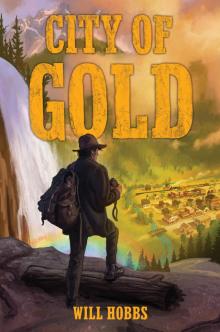 City of Gold
City of Gold Kokopelli's Flute
Kokopelli's Flute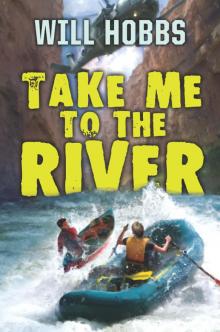 Take Me to the River
Take Me to the River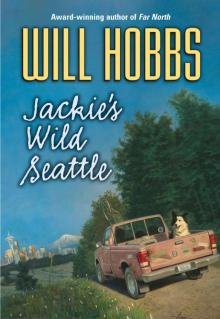 Jackie's Wild Seattle
Jackie's Wild Seattle The Maze
The Maze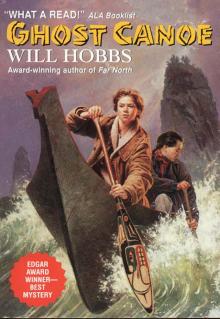 Ghost Canoe
Ghost Canoe Never Say Die
Never Say Die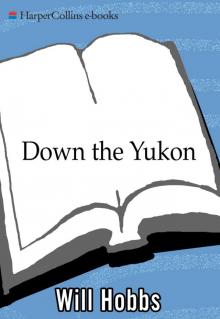 Down the Yukon
Down the Yukon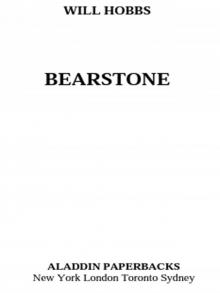 Bearstone
Bearstone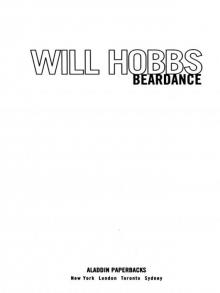 Beardance
Beardance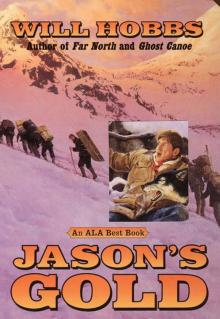 Jason's Gold
Jason's Gold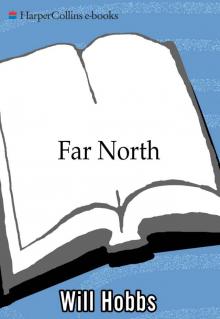 Far North
Far North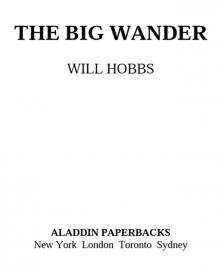 The Big Wander
The Big Wander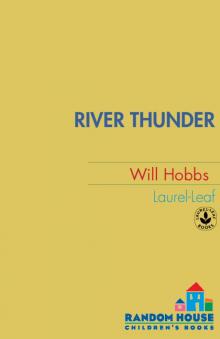 River Thunder
River Thunder Downriver
Downriver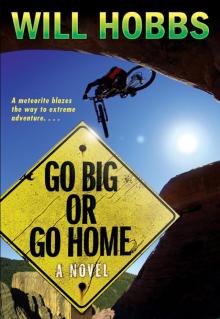 Go Big or Go Home
Go Big or Go Home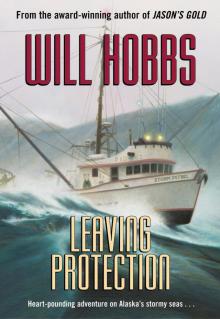 Leaving Protection
Leaving Protection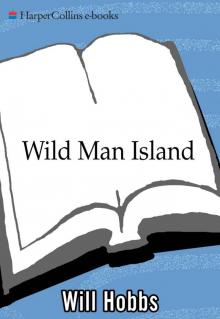 Wild Man Island
Wild Man Island